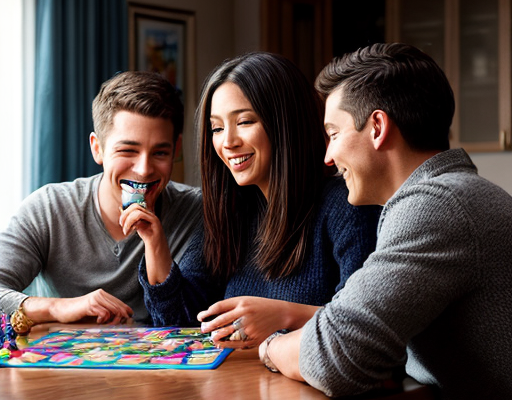
12 Games to Improve Family Communication
12 Games to Improve Family Communication
In today’s digital age, family communication can often be limited to brief exchanges over meals or text messages. However, fostering strong communication skills within the family is crucial for maintaining healthy relationships and creating a supportive environment. Playing games together can be a fun and effective way to improve family communication. In this article, we will explore 12 games that can help you and your family develop better communication skills.
1. Charades
Charades is a classic game that requires players to communicate without words. It encourages nonverbal communication, creativity, and teamwork. Split your family into two teams and take turns acting out words or phrases while the other team tries to guess. This game promotes active listening, body language interpretation, and clear expression.
2. Two Truths and a Lie
Two Truths and a Lie is a game that encourages storytelling, active listening, and critical thinking. Each family member takes turns sharing two true statements and one false statement about themselves. The others have to guess which statement is the lie. This game encourages active engagement and helps family members get to know each other better.
3. Pictionary
Pictionary is a drawing-based game that requires players to communicate their ideas visually. Divide your family into teams and take turns drawing and guessing words or phrases. This game enhances visual communication skills, creativity, and interpretation.
4. The Sentence Game
The Sentence Game is a word-based game that promotes active listening and effective communication skills. Start by giving one family member a word. They then create a sentence using that word and pass it on to the next person. The sentence continues to be passed around, with each person adding one word to it. The game ends when a complete, often hilarious, sentence is created. This game encourages attention to detail and collaboration.
5. Would You Rather
Would You Rather is a game that sparks interesting conversations and debates. Take turns asking each other hypothetical questions that present two challenging options. This game encourages family members to express their preferences, reasoning, and engage in healthy debates.
6. Story Cubes
Story Cubes are dice with various pictures on each side. Roll the dice and create a story using the pictures shown. This game promotes creativity, active listening, and storytelling skills. It allows family members to express their imagination and practice effective communication in a fun and interactive way.
7. The Name Game
The Name Game is a memory and communication game that helps family members learn and remember each other’s names. Start by saying your own name and adding an adjective that begins with the same letter as your name (e.g., “Funny Fiona”). The next person then says the previous person’s name and adjective before adding their own. This game helps improve memory, attention, and active listening skills.
8. The Story Starters
The Story Starters game encourages creative writing and verbal communication. Write down different story prompts and place them in a jar. Each family member takes turns picking a prompt and starting a story. The story then continues as each person adds a sentence or two. This game helps develop language skills, imagination, and collaboration.
9. Conversation Jenga
Adapt the classic Jenga game by writing conversation prompts on the blocks. When a player pulls out a block, they must answer the question or discuss the topic written on it. This game promotes active listening, engagement, and deepens family conversations.
10. Guess the Emotion
Guess the Emotion is a game that helps family members practice empathy and emotional intelligence. Take turns acting out different emotions without using any words, while the others try to guess the emotion being portrayed. This game encourages nonverbal communication, empathy, and emotional understanding.
11. Storytelling Telephone
Storytelling Telephone is a game that tests listening skills and challenges the accuracy of communication. One person starts by whispering a short sentence to the next person, who then whispers it to the next, and so on until it reaches the last person. The last person shares the sentence out loud, and the initial sentence is compared to how it evolved through the chain. This game highlights the importance of effective listening and communication.
12. I Spy
I Spy is a game that encourages active observation and description skills. Take turns stating “I spy with my little eye, something that is…” and provide a clue about something you see. The other family members guess what it might be. This game helps develop attention to detail, descriptive language, and observation skills.
Playing these games not only enhances family communication skills but also creates memorable and enjoyable moments for everyone involved. Remember to approach the games with a spirit of fun, collaboration, and open communication. Enjoy the opportunity to strengthen your family bonds while sharpening your communication skills!

